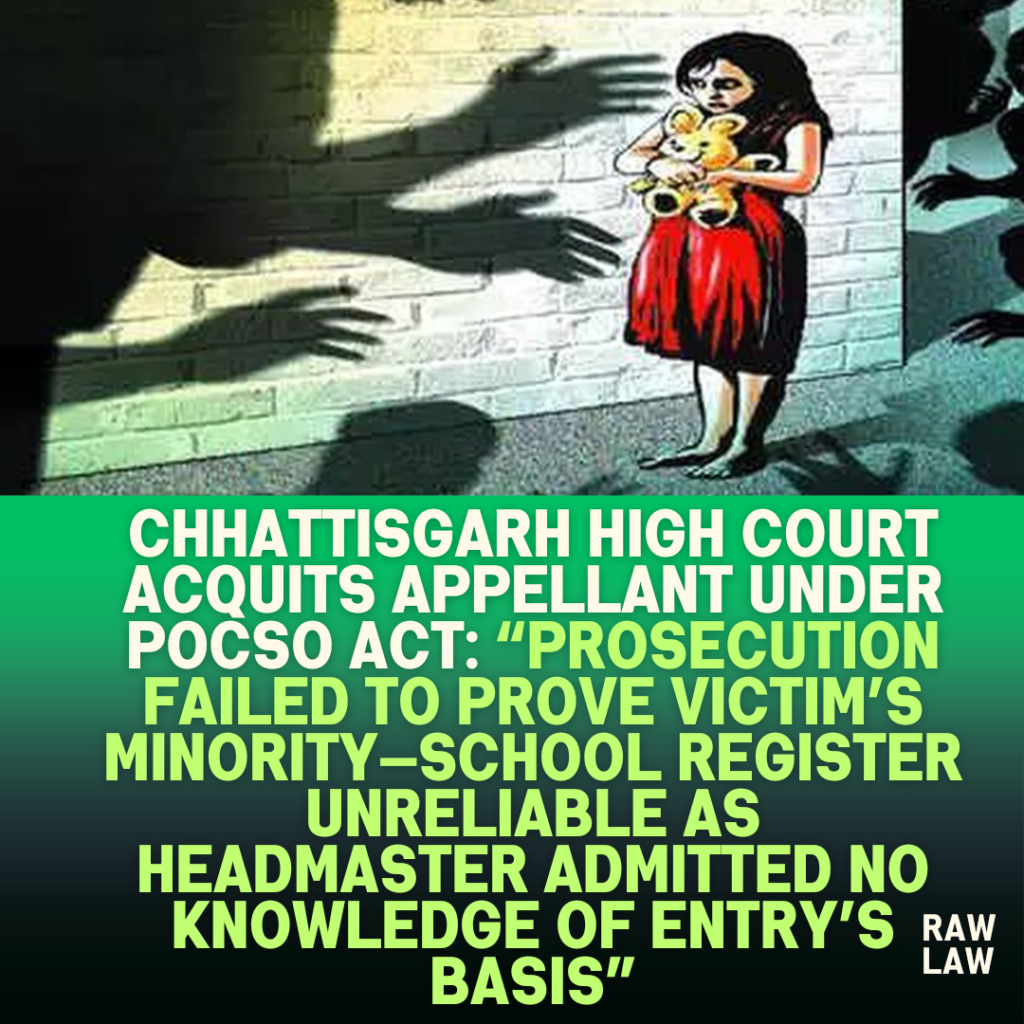Court’s Decision
In Ramgopal v. State of Chhattisgarh, the Division Bench of the Chhattisgarh High Court comprising Justices Sanjay K. Agrawal and Deepak Kumar Tiwari set aside the conviction under Section 6 of the POCSO Act, extending the benefit of doubt to the appellant. The Court held that “the prosecution has utterly failed to establish that on the date of the incident, the victim was a minor,” and further held that “there is no definite opinion regarding sexual intercourse nor any FSL report on record.” The Court concluded that the prosecution failed to discharge its burden to prove the charges and acquitted the appellant.
Facts
The criminal appeal was filed under Section 374(2) CrPC by the appellant challenging the judgment of conviction dated 12.01.2016, wherein he had been convicted under Section 6 of the POCSO Act and sentenced to life imprisonment with a fine of ₹20,000, with default imprisonment of one year.
The victim, allegedly aged 16, lodged a written complaint at Police Station Seepat on 05.10.2014 stating that the appellant, a teacher, had been in a relationship with her for a year, and under the false promise of marriage, sexually exploited her. She further alleged that upon demanding marriage, he refused, threatened her, and offered ₹20,000 to leave the village. A case was registered, and the victim underwent a medical examination.
The school register showed her date of birth as 04.11.1998. However, the ossification test conducted on 09.10.2014 estimated her age to be 19 years or above. After investigation, charges were framed and trial proceeded. The trial court convicted the appellant solely under Section 6 of the POCSO Act, considering it the graver offence under Section 42 of the Act.
Issues
- Whether the victim was a minor on the date of the alleged offence?
- Whether the prosecution was able to prove the offence under Section 6 of the POCSO Act beyond reasonable doubt?
Petitioner’s Arguments
The appellant contended that:
- The victim was not a minor on the date of the incident. As per the ossification test report (Ex.-P/18), her age was 19 years or above on 09.10.2014.
- The entry in the school register (Ex.-P/20) was not reliable as the headmaster (PW-11) admitted that he neither made the entry nor knew the basis on which the date of birth was recorded.
- The victim was in a consensual relationship with the appellant for a year and lodged the FIR belatedly.
- No conclusive medical or forensic evidence was presented; Dr. Sheela Saha (PW-9) did not give a definite opinion and no FSL report was filed.
Respondent’s Arguments
The State defended the conviction and argued that:
- The trial court had rightly convicted the appellant based on the evidence.
- The charges were established beyond reasonable doubt.
- The school register indicated that the victim was a minor at the time of the incident.
Analysis of the Law
The Court evaluated the admissibility and evidentiary value of school records and ossification tests:
- Relying on Ravinder Singh Gorkhi v. State of UP (2006) 5 SCC 584 and Babloo Pasi v. State of Jharkhand (2008) 13 SCC 133, the Court reiterated that school records alone are not sufficient to prove age unless the basis for the entry is substantiated.
- Citing Madan Mohan Singh v. Rajni Kant (2010) 9 SCC 209, the Court emphasised that probative value depends on the source and authentication of entries.
The Court held that the entry in the school register (Ex.-P/20) lacked supporting documents or testimony regarding its authenticity. On the contrary, the ossification report conducted by Dr. S.K. Tiwari (PW-8) clearly estimated the age to be 19 years or above.
Precedent Analysis
- Ravinder Singh Gorkhi v. State of UP: Emphasised that school register entries require proof of source and authority for admissibility under Section 35 of the Evidence Act.
- Babloo Pasi v. State of Jharkhand: Held that entries in school or voters’ lists are of little evidentiary value in absence of corroborative material.
- Madan Mohan Singh v. Rajni Kant: Highlighted that official entries are subject to scrutiny of their authenticity and cannot be blindly accepted.
The Court adopted the ratio laid down in these decisions to reject the school register entry and prefer the ossification test as more reliable in determining the victim’s age.
Court’s Reasoning
The Court observed:
- “The prosecution has failed to establish that on the date of the incident, the victim was minor.”
- “The relevant document on the basis of which entries were made in the School Admission Register (Ex.P/20) was not filed and proved.”
- “No FSL report was filed or proved, and Dr. Sheela Saha has not given any definite opinion about recent sexual intercourse.”
- “The conduct of the victim herself, not disclosing her relationship for a substantial period, indicates consent.”
Given these findings, the Court held that the burden of proof had not been discharged and the appellant was entitled to the benefit of doubt.
Conclusion
The appeal was allowed. The conviction and sentence under Section 6 of the POCSO Act were set aside. The appellant was acquitted by granting him the benefit of doubt. Since he was already on bail, the Court directed that the bail bonds would remain in operation for six months under Section 437-A CrPC.
Implications
This decision underscores the importance of establishing the minority of the victim beyond reasonable doubt in POCSO prosecutions. It reiterates that documentary evidence such as school registers must be corroborated with foundational documents. The judgment affirms the principle that when medical and documentary evidence conflict, courts must lean on more reliable and authenticated sources.
Also Read: Bombay High Court Affirms Life Imprisonment for Man Who Murdered Mother-in-Law Amid Domestic Discord



